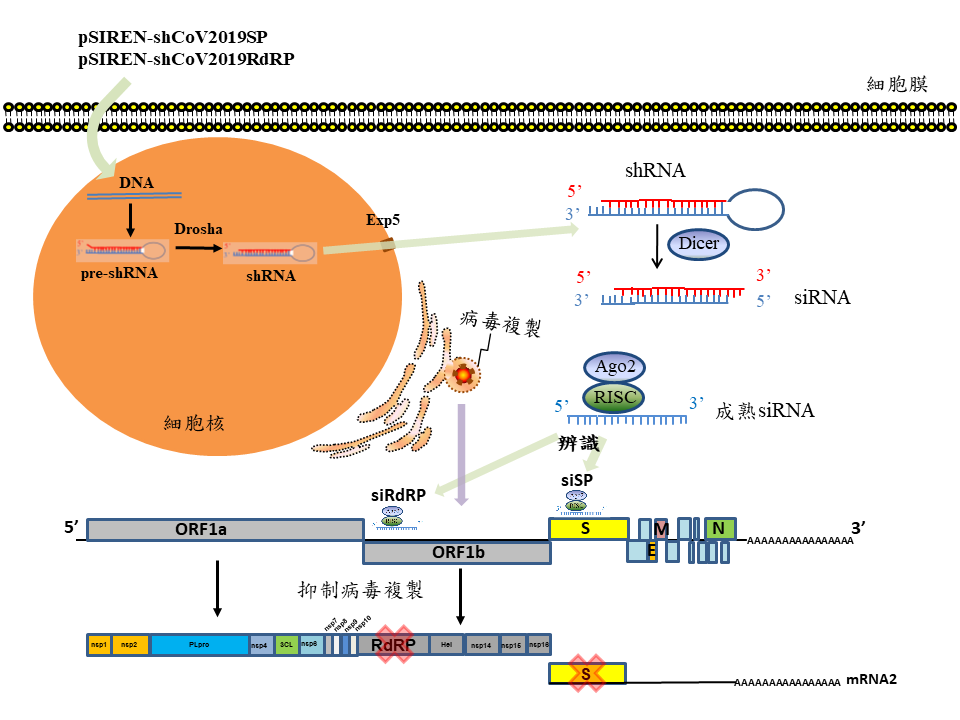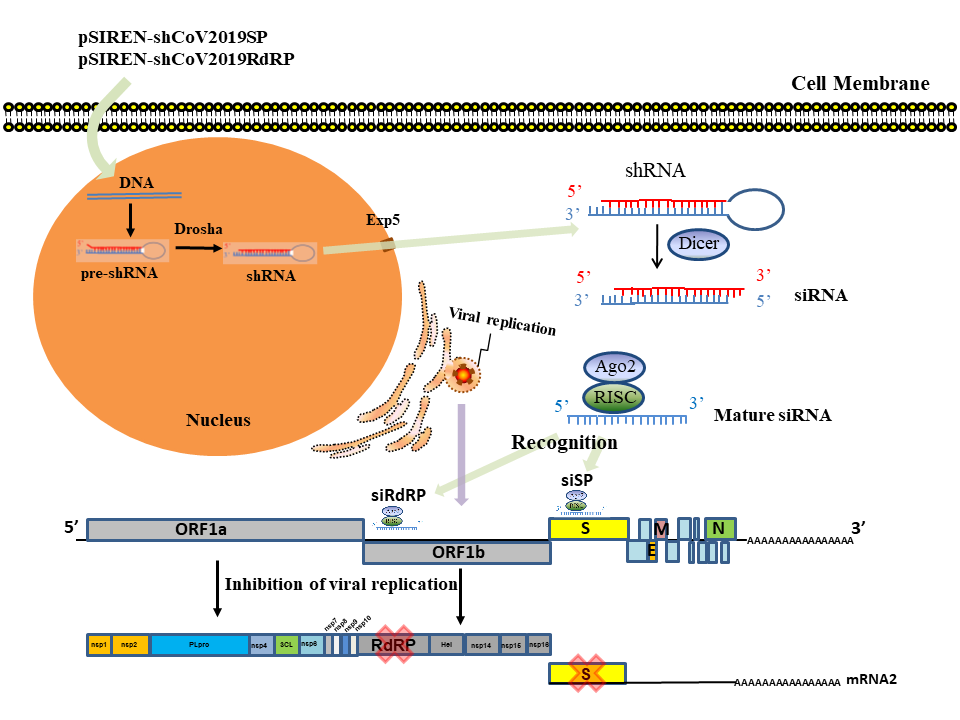利用核苷酸干擾的策略來防治新冠病毒的感染
利用核苷酸干擾的策略來防治新冠病毒的感染
COVID-19引發全球性危機,在全世界造成災難性的威脅。雖然目前有疫苗及藥物(如瑞德西偉及奈瑪特偉、利托那韋等),可用於預防及治療,但此病毒的變異太快,疫苗及藥物的防護力可能隨時被突破,令人十分憂心。
我們在2020年初便利用核苷酸干擾的技術,透過電腦預測,製作兩個可以干擾新冠病毒武漢病毒株不同基因區段的小片段RNA,透過試驗將之送入非洲綠猴細胞中,並給予SARS-CoV-2臨床病毒株感染,發現這兩個小片段RNA可以成功干擾SARS-CoV-2病毒的複製,並達到約50%的抑制效果。通過基因比對發現這兩個小片段RNA對目前已知六百多萬種新冠病毒病毒株皆具有抑制效果,其中一個小片段RNA甚至對現行難纏的Omicron病毒株也具有抑制效果!由於小片段RNA的製備簡單,並且可以依照目前流行的病毒基因序列立即改變設計,因此,更加適合應用在對付類似新冠病毒這種突變率高的病毒。
未來可以透過混和數種小片段RNA,以類似雞尾酒的方式來對抗各式各樣的新冠病毒突變株,並且可以透過劑型調整,製造鼻噴劑型,將可用於新冠病病毒感染呼吸道的預防及治療。

應用與亮點:
1.siRNA抑制新冠病毒專一性高,製造方法簡單、快速、便宜。
2.針對具有高突變率之病毒,疫苗及藥物的防護力可能隨時被突破,但此方法可以立刻做出相應改變,以維持其效應。
3.可製作成鼻噴劑型,對新冠病毒造成之呼吸道感染之治療或預防,使用方便。
【研究團隊】
團隊成員:
包括高雄醫學大學醫學系微免學科李英瑞副教授、成大醫院病理部病毒組組長兼成大醫學院醫技系臨床助理教授蔡慧頻、病毒組葉峻昇醫檢師、嘉義基督教醫院轉譯醫學中心方瓊瑤副研究員、中正大學生物醫學科學系陳永恩教授、嘉義基督教醫院胸腔外科吳姿澐研究助理、嘉義基督教醫院沈正煌教授。
代表單位:
高雄醫學大學熱帶醫學暨傳染病研究中心
團隊主要成員簡介:
李英瑞博士是高雄醫學大學醫學系微免學科專任副教授,同時也是高學醫學大學熱帶醫學研究所、醫學系後醫學系兼任副教授,以及熱帶醫學暨傳染病研究中心研究員。
研究聯繫E-mail: yingray.lee@gmailc.om
蔡慧頻助理教授是成大醫院病理部病毒組組長,並兼任成大醫學院醫技系臨床助理教授。
研究聯繫E-mail: tsaihp@ncku.edu.tw
沈正煌博士是嘉義基督教醫院泌尿外科主治醫師,同時也是亞洲大學食品營養與保健生技學系兼任教授。
研究聯繫E-mail: 01712@cych.org.tw
【論文資訊】
論文出處:Viruses. 2023, 15(1): 100.
全文下載:https://www.mdpi.com/1999-4915/15/1/100
Using RNA interference strategy to prevent and control the infection of SARS-CoV-2
Using RNA interference strategy to prevent and control the infection of SARS-CoV-2
COVID-19 has sparked and caused disaster around the world. Although there are vaccines and drugs (such as Remdesivir, Naimatevir, Ritonavir, etc.) that can be used for prevention and treatment for COVID-19, the virus mutates too quickly, and the protective effect of vaccines and drugs may be broken at any time. Therefore, to develop an alternative strategy for prevention or therapeutics of SARS-CoV-2 infection is urgent.
At the beginning of 2020, using RNA interference approach, we designed two small interference RNAs (siRNAs) that can target with different gene segments of the Wuhan virus strain of SARS-CoV-2. These two siRNA constructions have been transfected into African green monkey cells, and challenged with clinical isolated SARS-CoV-2 virus strain. The result demonstrated that these siRNA constructions could significantly suppress viral replication about 50%. Using BLAST analysis, both siRNAs could target on more than six million known SARS-CoV-2 strains. Most importantly, one of the siRNAs that we designed could recognize and target on Omicron strain, a difficult strain of SARS-CoV-2. Because the preparation of siRNA is simple, and the design of targeting sequence can be changed immediately according to the current viral gene sequence. Therefore, it is more suitable for use in dealing with viruses with a high mutation rate like SARS-CoV-2.
In the future, we suggest that using different siRNAs mixture as cocktail to against various mutants of SARS-CoV-2. Moreover, through formulation design, a nasal spray formulation can be made, which will be used for the prevention and treatment of the respiratory tract infected SARS-CoV-2.

Application and Highlights:
1.siRNA against SARS-CoV-2 virus exerts highly specificity, and the manufacture is simple, fast, and cheap.
2.Viruses with high mutation ability, the protection of vaccines or anti-viral drugs may be broken at any time. Fortunately, siRNA approach can be changed immediately with the mutated viral sequence and to maintain its effect.
3.It can be formulated as nasal spray, which is easy to use for the treatment or prevention of respiratory infections by SARS-CoV-2.
Research Team Members:
Ying-Ray Lee, Huey-Pin Tsai, Chun-Sheng Yeh, Chiung-Yao Fang, Michael W. Y. Chan, Tzu-Yun Wu and Cheng-Huang Shen
Representative Department:
Center for Tropical Medicine and Infectious Disease Research, Kaohsiung Medical University
Introduction of Research Team:
Dr. Ying-Ray Lee is an Associate Professor of Department of Microbiology and Immunology, Adjunct Associate Professor of Faculty of Post-Baccalaureate Medicine and Master of Science Program in Tropical Medicine, College of Medicine, Kaohsiung Medical University, and is an Investigator of Center for Tropical Medicine and Infectious Disease Research, Kaohsiung Medical University.
E-mail: yingray.lee@gmailc.om
MS. Huey-Pin Tsai is the leader of virus group in Department of Pathology, National Cheng Kung University Hospital, and is an Adjunct Clinical Assistant Professor of Department of Medical Laboratory Science and Biotechnology, College of Medicine, National Cheng Kung University.
E-mail: tsaihp@ncku.edu.tw
Dr. Cheng-Huang Shen is a clinical doctor of Department of Urology, Ditmanson Medical Foundation Chiayi Christian Hospital. He is also an Adjunct Professor of Department of Health and Nutrition Biotechnology, Asia University.
E-mail: 01712@cych.org.tw
Publication: Viruses. 2023, 15(1): 100.
Full-Text Article: https://www.mdpi.com/1999-4915/15/1/100


